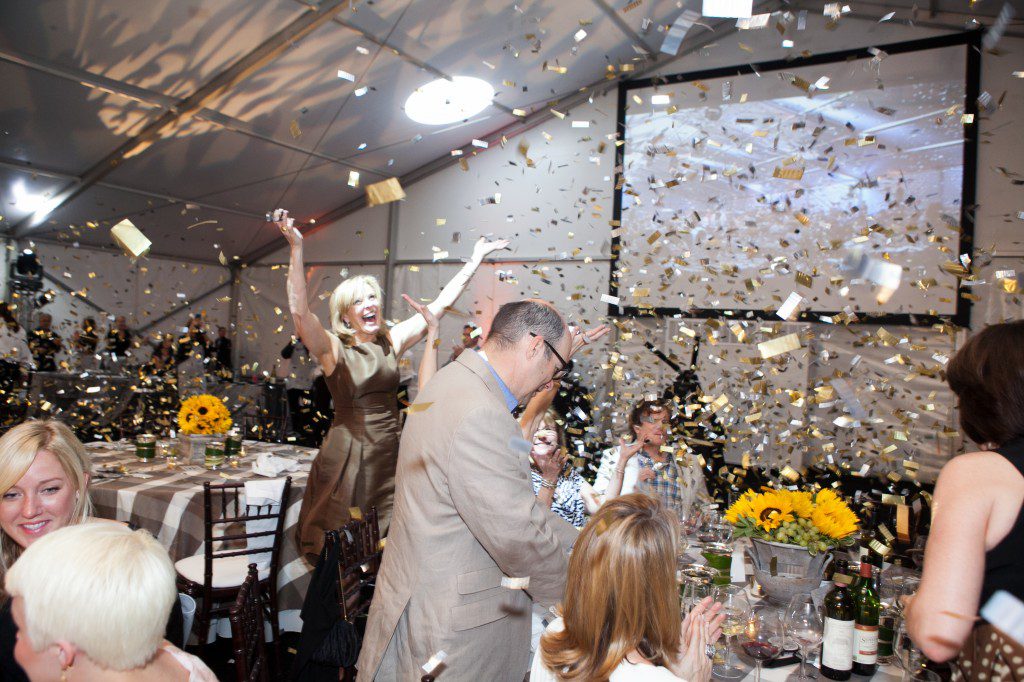
Photo courtesy Philbrook Museum of Art.
Building Bridges, Shaping Minds
As trusted, welcoming places for discovery, museums play a strong role in early learning for children. This is true at Philbrook, too.
A key supporter of the Tulsa community, the museum proactively works to help bridge this gap to build brighter futures. By offering free programs aiming to bring families together through hands-on activities and museum exhibits, the museum has taken on what has become a national challenge.
“In 2008 only two percent of the Philbrook education budget centered on families. Currently, we spend 41 percent of that budget on families. We want to provide a place for families to come together to interact and engage with each other,” Suffolk says.
“When we kicked off the Second Saturday program six years ago, we made it free because we wanted to remove any real or perceived barriers to access. We really challenged our education department to rally around that day to create a series of hands on, family-oriented, art-making activities.”
Second Saturdays offers free museum admission and interactive art experiences for children of all ages on the second Saturday of each month. ONEOK Foundation joined forces with Philbrook to underwrite Second Saturdays through February 2016 to the tune of $400,000. In 2007 (before the Second Saturdays program), Philbrook averaged about 490 visitors on the same day. Today, the average is 2,000 people, with peak Saturdays seeing as many as 2,900.
Holbrook Lawson, chair of Philbrook’s board of directors, ties this growth in participation back to a focus on inclusivity and collaboration in diversifying the museum at every level.
“It doesn’t matter your background: All parties can benefit through the experience of art. Art is for all people,” says Lawson.
A fourth-generation museum board member, Lawson remembers childhood trips to the museum and discovering early on that her appreciation for art exceeded her ability to create it.
“There’s a misconception that some people have, where they think that they need to be an ‘art person’ to appreciate art,” she says, “but what Philbrook does is give you the opportunity to learn and find your own unique appreciation for art. I think that simply being exposed to art allows your brain to relax, then ideas and problem-solving come to you. Art can soothe the soul and invigorate; it provides something that’s missing in our everyday rush. It provides a much-needed element in our lives that helps us do our jobs better.”
Designed with the diversity of the Philbrook permanent art collection in mind, the MyMuseum program, a free program targeted at children aged 4 to 12, has done an outstanding job of encouraging children and their caregivers to draw appreciation and inspiration through creativity.
Families can sign up for the program, which gives kids a free art tool kit containing three art implements. Then each month, the family returns to receive a new supply and a new art card, which references a different featured work in the museum. Through a year of collecting, the kits can grow to contain a sketchpad, pencil, eraser, watercolors, markers and glue, depending on the artwork identified on the art card.
Parents or caregivers get involved, too. The art card contains information and talking points that they can discuss while observing the featured art in the museum with their children.
“For decades young children have been enjoying Philbrook. And I’m sure there are children – or anyone for that matter – who grew up visiting Philbrook and can say, ‘Because I had these experiences at Philbrook where I became inspired or learned something new, I am now an engineer or software developer or invented something amazing,’” Lawson adds. “I believe that we are touching lives and helping people to use all parts of their brains to explore, problem solve, create and innovate.”
Taking the MyMuseum program one step further, Philbrook has partnered with Junior League of Tulsa and The Children’s Hospital at Saint Francis for the MyMuseum Mobile program, which takes art projects and activities to children unable to visit the museum and others with limited access.
Initiated in fall 2013, the program shares MyMuseum with children in the oncology ward of The Children’s Hospital, where young patients are treated for cancer, leukemia and other blood-related illnesses. Using the art kits, trained volunteers from the Junior League of Tulsa engage with children in art-making projects.
Their families, who spend countless days and hours at the hospital, are given free museum passes so that they have a place to take a break or to visit the museum later as a family after their child has recovered.
“Within a couple of weeks of kicking off the program, one of the patients and their family visited the museum. The family expressed their gratitude to museum staff members and shared their enthusiasm for touring the museum and adding to their art kit with new art supplies,” says Chris Oden, chair of MyMuseum Mobile committee and a member of Junior League of Tulsa.
“Art can teach you about yourself; it’s a really relaxing, therapeutic approach to reach out to these families with the hopes that we are offering a valuable experience that can help them reflect and think about something different. We want to help them deal with a very difficult time in their lives,” Lawson says.























